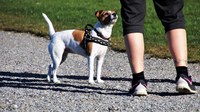Prairie Fare: Motivate Yourself With a Fitness Buddy
(Click an image below to view a high-resolution image that can be downloaded)
By Julie Garden-Robinson, Food and Nutrition Specialist
NDSU Extension
I have watched an ongoing fashion parade in the late winter and early spring as I looked out the window of our home office.
I have seen fashionistas walk by in bright pink coats, camouflage vests and argyle sweaters. One of the fashionable walkers was wearing pants.
One day I observed brightly colored boots on four small feet trot by.
The dog didn’t look embarrassed about wearing day-glow orange boots. My dogs would not have been patient with foot attire or pants, for that matter.
I decided our three dogs were a little behind the times fashionwise during the cold stretch. The thermometer dipped to minus 20 for a while, so they needed some warm clothes, I reasoned.
I picked up some end-of-the-season handsome sweaters.
Chester was not impressed with his new sweater. We found it in a snowbank in the backyard.
The weather has warmed. Based on the foot traffic, I think our neighborhood pet population has grown considerably in the past year.
According to some reports, pet adoption jumped significantly as people spent more time at home during the past year.
Some pet rescues saw an increase in the pet adoption rate of 40%.
Many people embraced the companionship of a trusted furry sidekick. Shelters often could not keep up with demand, even as other people abandoned pets due to personal budget issues.
As people have stayed inside, pets and humans have gained weight. “The pandemic 15” is frequently cited as an issue that has arisen during the past year.
One of my buddies, Louis the dachshund, gained nearly 2 pounds. That would be like an average adult gaining 15 pounds.
After that revelation by our vet, Louis is on a weight-management diet. I changed his food-scoop size from one-half cup to one-third cup. He will be spending more time in the backyard and on walks in the warmer weather.
Unfortunately, he is on a medication that makes him ravenously hungry.
He wolfs down his food, then he tries to steal his canine brothers’ food. I keep them in separate places during feeding time, but Louis is sneaky.
Being an amateur “dog dietitian” is a bit tricky.
Having an exercise and diet buddy, whether human or animal, can help maintain the motivation to continue to exercise and eat healthfully.
Pets are good for our health, and they can promote increased physical activity.
Researchers at Michigan State University reported that people who walked their dogs were 34% more likely to meet the national physical activity goals. In fact, dog owners, on average, accumulated 60 minutes more physical activity per week than those without dogs.
Not everyone, of course, wants to take on the responsibility of pet ownership. If you decide to adopt a pet, be sure to consider your own circumstances. Do you have enough space, time and money to house, feed and medically care for a pet?
Of course, you do not need a pet on a leash to propel you down the sidewalk. A human walking companion also works well. Or put in some ear buds and listen to tunes on a solitary walk.
Having a buddy who is more fit than you can increase your workout time and intensity by 200%, according to another Michigan study.
Walking can energize you and lift your mood while strengthening bones and toning your muscles. Walking can reduce your blood pressure and reduce your risk for diabetes and heart disease.
Getting more physical activity can reduce your risk for some forms of cancer. Physical activity can help improve our mental health and help us sleep better.
Fitness experts suggest that we aim for 30 minutes of moderate physical activity on most days of the week. These are some tips adapted from the Weight Information Network, an information service of the National Institute of Diabetes and Digestive and Kidney Diseases. Check with your health-care provider before making major lifestyle changes.
- Choose a safe place to walk. Find a partner to encourage and support each other.
- Wear shoes with proper arch support, a firm heel and thick, flexible soles. When you buy shoes, be sure to walk around the store before you take them home. Try to buy your shoes late in the day when your feet are at their largest.
- Wear clothes that keep you dry and comfortable.
- Divide your walk into three parts. First, warm up slowly and then increase your speed to a brisk walk. Walk fast enough to elevate your heart rate while still being able to speak comfortably, concentrate and breathe without effort. Finally, cool down after your walk.
- Break up your walk into multiple sessions throughout the day if you have a busy schedule. Be sure each session is at least 10 minutes long.
- Set goals and reward yourself for your progress. Instead of splurging on a calorie-dense treat, see a movie, read a magazine or take time to do something else you enjoy.
- Keep track of your progress with a walking journal, log or calendar. Record the date, time and distance.
Hungry for a snack? Make your snacks count toward a healthful diet. By the way, this recipe is not a pet-friendly treat but the whole grains, nuts and dried fruit are good for us humans. Raisins (and grapes) can be toxic to dogs. Ask your veterinarian for more information about feeding your pet.
Fiesta Snack Mix
1 c. whole-grain cereal with fruit
1 c. Chex-type bran cereal
1 c. O-type whole-grain oat cereal
1/4 c. raisins or dried cranberries
1/4 c. peanuts
1/4 c. shredded coconut
Mix together and put half-cup portions in lock-type sandwich bags for quick snacks.
Makes eight servings. Each serving has 110 calories, 4.5 grams (g) fat, 3 g protein, 17 g carbohydrate, 2 g fiber and 80 milligrams sodium.
(Julie Garden-Robinson, Ph.D., R.D., L.R.D., is a North Dakota State University Extension food and nutrition specialist and professor in the Department of Health, Nutrition and Exercise Sciences. Follow her on Twitter @jgardenrobinson)
NDSU Agriculture Communication - March 11, 2021
Source: Julie Garden-Robinson, 701-231-7187, julie.garden-robinson@ndsu.edu
Editor: Ellen Crawford, 701-231-5391, ellen.crawford@ndsu.edu




